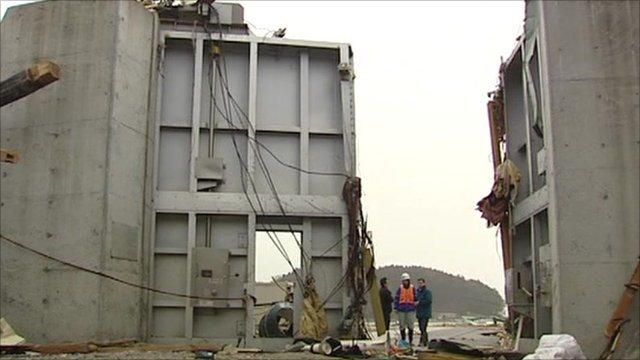 The United Nations nuclear agency (IAEA) says there have been positive developments in Japan's efforts to tackle a nuclear emergency after the 11 March quake.
The United Nations nuclear agency (IAEA) says there have been positive developments in Japan's efforts to tackle a nuclear emergency after the 11 March quake.
The IAEA said smoke or vapour rising from one of the overheating reactors at the damaged Fukushima power plant had become less intense.
But it said the overall situation remained very serious.
The overall death toll has now risen to 8,450, with 12,931 people missing.
Electricity has been restored to three reactors at the crippled Fukushima nuclear power plant - this should allow the use of on-site water pumps soon.
Engineers have been spraying fuel rods with salt water to try to cool them enough to avert radiation leakage.
Villagers living near the plant have been told not to drink tap water due to higher levels of radioactive iodine.
"There have been some positive developments in the last 24 hours but overall the situation remains very serious," said Graham Andrew, a senior IAEA official.
"We consider that now we have come to a situation where we are very close to getting the situation under control," Deputy Cabinet Secretary Tetsuro Fukuyama said.
However, bad weather forced the Japanese Prime Minister, Naoto Kan, to cancel a planned visit to emergency workers near the Fukushima plant.
It is also making the recovery work a much more grim and difficult task.
Search-and-relief efforts in the prefecture of Miyagi, where the police chief believes the final quake-tsunami death toll could reach 15,000, have been delayed by driving rain.
"We basically cannot operate helicopters in the rain," Miyagi official Kiyohiro Tokairin said.
"We have been using helicopters to deliver relief goods to some places but for today we have to switch the delivery to places that we can reach by road," he said.
Food fears
Heavy rain has intensified fears of radiation contamination too.
A Fukushima prefecture official said radiation levels tended to rise when rain fell, warning people to try to stay dry, or to dry off quickly after being in the rain.
Attention has also turned to contamination of food supplies.
"The contamination of food and water is a concern," said Gerhard Proehl of the IAEA.
One of the BBC's correspondents in Tokyo, Chris Hogg, says the government is expected to announce new measures later to try to prevent produce and goods containing radiation reaching the market.
Over the weekend spinach and milk produced near the Fukushima nuclear plant was found to contain levels of radioactive iodine far higher than the legal limits, although not at levels that would be a risk to human health.
Radioactive materials three times higher than the legal safety limit were detected in the water there.
There are still shortages of food, water, and medicine in some of the worst affected parts of the country, our correspondent says.
Crematoria are reported to be struggling because there are so many dead and not enough fuel.
Nearly 900,000 households are still without water.
More than 35,000 people are still living in evacuation centres.
"Even if certain things go smoothly, there would be twists and turns," Chief Cabinet Secretary Yukio Edano told reporters.
"At the moment, we are not so optimistic that there will be a breakthrough."
Rescue workers have said the business of collecting bodies has become more disturbing with the passage of time.
"The recent bodies - we can't show them to the families. The faces have been purple, which means they are starting to decompose," says Shuji Horaguchi, a disaster relief official in Natori, near Sendai.
"Some we're finding now have been in the water for a long time, they're not in good shape. Crabs and fish have eaten parts."
But there was some good news after an 80-year-old woman and her grandson were found alive in the rubble of Ishinomaki city.



